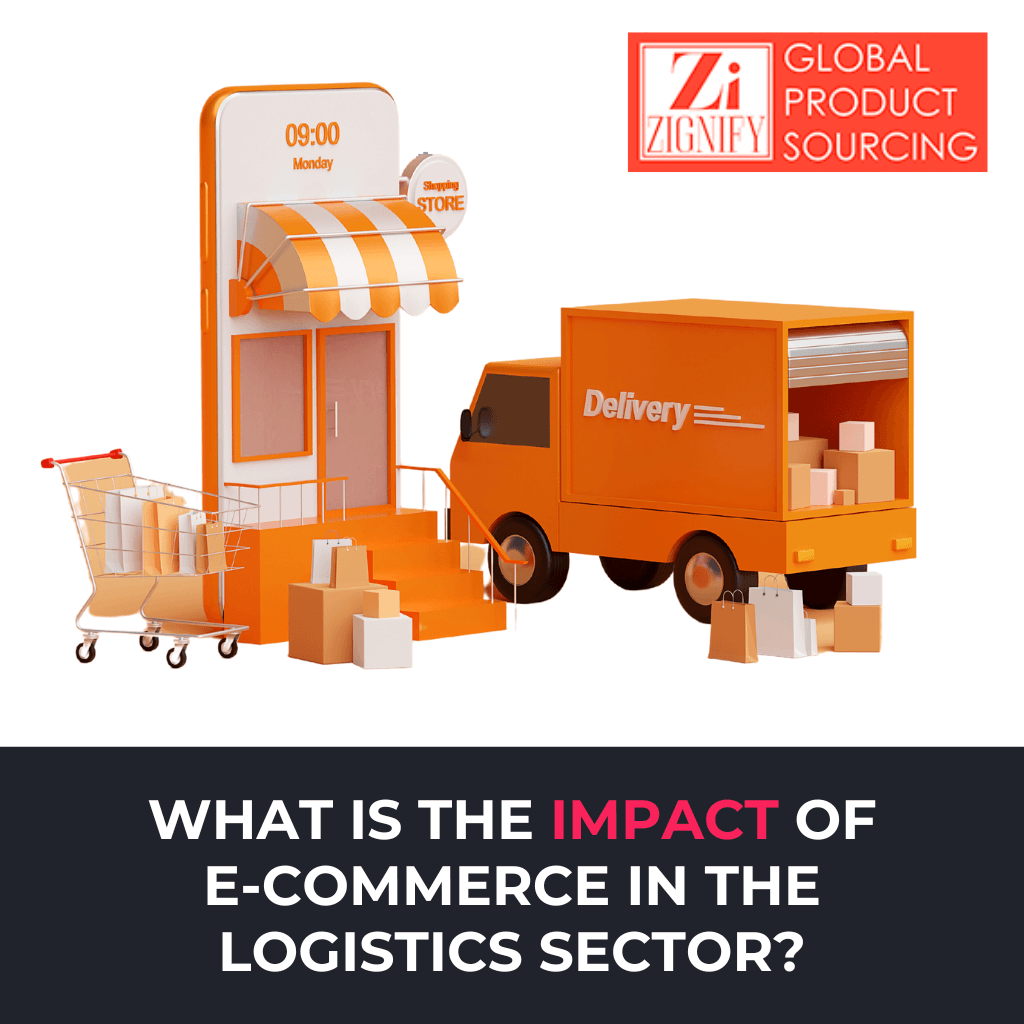
In the age of digitalization and convenience, e-commerce has emerged as a game-changer in the retail industry. With a simple click, consumers can now shop for products from the comfort of their homes, leading to a significant shift in buying patterns. While this has undoubtedly transformed the way we shop, it has also unleashed a tidal wave of changes in the logistics sector.
E-commerce is booming. In 2021, retail e-commerce sales worldwide were an estimated $4.9 trillion. This number is expected to grow by 56% over the next four years, reaching approximately $8.1 trillion by 2026. There are no signs of this trend slowing down anytime soon.
According to Statista, Amazon> is the top online retailer, with almost 3.16 billion monthly visitors in 2022. This means that more than 30% of the world’s population visited Amazon’s website in a single month.
In this comprehensive article, we will delve deep into the transformative effect of e-commerce on the logistics industry. Explore how increased online shopping has led to changes in warehousing, transportation, and delivery processes. Discuss the challenges and opportunities posed by e-commerce growth for logistics companies.
What Changes has E-commerce brought to the Logistics industry?
The global e-commerce logistics market was valued at USD 315.82 billion in 2022 and is expected to grow at a compound annual growth rate (CAGR) of 22.3% from 2023 to 2030. E-commerce has brought significant changes to the logistics industry, transforming the way goods are stored, transported, and delivered. Some of the notable changes and impacts include:
- Increased demand for logistics services: E-commerce has led to an increase in the demand for logistics services, such as warehousing, transportation, and delivery. This is because online shoppers require fast and efficient delivery of their orders.
- Shift in transportation modes: E-commerce has led to a shift in transportation modes, with a greater reliance on air freight and parcel delivery. This is because online shoppers demand faster delivery times, and air freight and parcel delivery are the fastest ways to transport goods.
- Increased use of technology: E-commerce has led to increased use of technology in logistics, such as the use of GPS tracking, data analytics, and automation. This technology helps logistics companies to optimize their operations and improve efficiency.
- Changes in supply chain management: E-commerce has also led to changes in supply chain management. For example, companies need to have more inventory on hand to meet the demands of online shoppers. They also need to be more agile in their supply chain operations in order to respond to changes in demand.
- Rise of reverse logistics: E-commerce has also led to the rise of reverse logistics, which is the process of returning goods to the seller. This is because online shoppers often return items that they have purchased online. Reverse logistics can be a challenge for logistics companies, but it is an important part of the e-commerce supply chain.
- Sustainability Initiatives: E-commerce has brought attention to the environmental impact of logistics operations. Many companies are implementing sustainability initiatives, such as electric delivery vehicles and eco-friendly packaging, to reduce their carbon footprint.
- Increased demand for warehousing and storage space: E-commerce has led to an increase in the demand for warehousing and storage space. This is because online retailers need to have a place to store the goods that they are selling. As a result, there has been a boom in the construction of new warehouses and distribution centers.
- Omnichannel Fulfillment: E-commerce has blurred the lines between physical and online retail. Many retailers now offer omnichannel fulfillment options, such as in-store pickup and same-day delivery, which require complex logistics coordination.
- Increased demand for skilled labor: E-commerce has also led to an increase in the demand for skilled labor in the logistics sector. This is because logistics companies need employees who are competent in using new technologies and handling large volumes of goods. As a result, the logistics sector has become a major employer, providing jobs for millions of people worldwide.
- Improved customer experience: E-commerce has also led to improved customer experience in the logistics sector. This is because logistics companies are now using technology to track orders and provide real-time updates to customers. This helps to ensure that customers know where their orders are and when they can expect to receive them.
- New Business Models: E-commerce has given rise to new logistics business models, including third-party logistics (3PL) providers specializing in e-commerce fulfillment, as well as technology-driven logistics startups that offer innovative solutions.
- Last-Mile Delivery Challenges: The “last mile” of delivery, which refers to the final leg of the shipping process from a distribution center to the customer’s doorstep, has become a critical focus in the logistics industry. E-commerce companies are experimenting with various last-mile delivery solutions, such as drones, autonomous vehicles, and crowd-sourced delivery platforms, to reduce costs and delivery times.
How increased online shopping has led to changes in warehousing, transportation, and delivery processes
The growth of online shopping has led to a number of changes in warehousing, transportation, and delivery processes. Here are some of the most significant changes:
- Warehousing: Online retailers need to have more warehouses in order to store the goods that they are selling. These warehouses need to be located close to major population centers in order to minimize delivery times.
- Transportation: Online retailers need to use more efficient transportation methods in order to get their products to customers quickly and cost-effectively. This has led to the increased use of air freight and parcel delivery services.
- Delivery: Online retailers need to offer a variety of delivery options in order to meet the needs of their customers. This includes same-day delivery, next-day delivery, and even same-hour delivery in some cases.
- Inventory Management: E-commerce has necessitated more accurate and agile inventory management systems. Real-time tracking of inventory levels, demand forecasting, and automated reorder processes are essential to prevent stock outs and overstock situations.
- Route Optimization: Transportation companies and logistics providers are increasingly using route optimization software to minimize delivery routes, save fuel, and reduce carbon emissions. This is crucial for meeting delivery time expectations while keeping costs in check.
- Customer Communication: E-commerce has increased the importance of clear and timely communication with customers. Real-time tracking, delivery notifications, and customer support have become essential to keep customers informed and satisfied.
- Security and Fraud Prevention: E-commerce deliveries often involve valuable goods, making security and fraud prevention crucial. Delivery confirmation, authentication, and anti-fraud measures have become integral parts of the delivery process.
Key challenges that logistics companies face in the e-commerce era
- Global Supply Chain Disruptions: Events like natural disasters, trade disputes, and the COVID-19 pandemic have exposed vulnerabilities in global supply chains. Companies must build resilience and contingency plans to address supply chain disruptions.
- The need for speed: Online shoppers expect fast and efficient delivery of their orders. This puts pressure on logistics companies to find ways to speed up their operations.
- Customer Expectations: E-commerce has raised customer expectations for fast, reliable, and transparent deliveries. Meeting these expectations while maintaining cost-efficiency is a constant challenge for logistics companies.
- The Need for Flexibility: The e-commerce market is constantly changing, with new products and services being introduced all the time. This requires logistics companies to be flexible and adaptable in order to meet the changing needs of their customers.
- Peak Season Demand: During peak shopping seasons, such as holidays and promotional events like lack Friday, logistics companies must handle a massive surge in order volumes. Scaling up operations to accommodate this demand without compromising service quality is a challenge.
- The Need for Security: E-commerce transactions involve the transfer of sensitive data, such as credit card numbers. This requires logistics companies to implement strong security measures to protect customer data.With the widespread use of tracking and tracing technologies in e-commerce, criminals can monitor shipments and identify opportune moments for theft, such as when a package is temporarily left unattended.
- Inventory Management: E-commerce requires efficient inventory management practices to ensure products are readily available to fulfill orders. Overstocking or stock outs can lead to inefficiencies and customer dissatisfaction.
- Supply Chain Visibility: Ensuring real-time visibility into the supply chain is vital for tracking shipments, managing inventory, and meeting customer expectations. Achieving this visibility across a complex supply chain can be a technological and logistical challenge.
- The need for sustainability: E-commerce has a significant environmental impact. Logistics companies need to find ways to reduce their environmental impact, such as by using more efficient transportation modes and reducing packaging waste.
As e-commerce continues to grow, these challenges are likely to become even more pronounced. However, logistics companies are innovating and finding new ways to meet the challenges of the e-commerce market. As a result, the logistics sector is likely to continue to grow and evolve in the years to come.
Opportunities Logistics Company Can Benefit From in the E-commerce Era
Despite these challenges discussed above, e-commerce also presents a number of opportunities for logistics companies. They include:
- The growth of new markets: E-commerce is expanding into new markets, such as rural areas and developing countries. This presents an opportunity for logistics companies to expand their operations into these new markets. These markets are often underserved by traditional brick-and-mortar retailers, so there is a great opportunity for logistics companies to provide e-commerce services to these consumers.
- Value-Added Services: Offering value-added services like product packaging customization, gift wrapping, and product assembly can differentiate a logistics company and provide additional revenue streams.
- Customized Solutions: In a global marketplace, one way to add an edge to your business is offering tailored logistics solutions to meet the unique needs of e-commerce businesses. This can be a lucrative niche. This might include specialized services for perishable goods, high-value items, or oversized products.
- The development of new technologies: The development of new technologies, such as drones and self-driving vehicles, is presenting new opportunities for logistics companies to improve their operations. These technologies can be used to improve efficiency, reduce costs, and provide better customer service. For example, drones can be used to deliver packages to remote areas or to customers who are unable to receive deliveries at home. Self-driving vehicles can be used to transport goods more efficiently and safely.
- Last-Mile Delivery Solutions: Developing efficient last-mile delivery solutions, including same-day and on-demand delivery options, can set logistics companies apart in the competitive e-commerce market. Offering flexible delivery windows, real-time tracking, and customer-friendly delivery experiences can attract more clients.
- The growth of the global economy: The growth of the global economy is creating new opportunities for logistics companies to expand their operations internationally. This is because e-commerce is becoming increasingly globalized, with consumers all over the world buying goods from online retailers in other countries. Logistics companies can position themselves to take advantage of this trend by expanding their international operations.
- Omnichannel Fulfillment: Providing services that support omnichannel retail strategies, such as click-and-collect, ship-from-store, and in-store returns processing, can be a lucrative opportunity. Logistics providers can help retailers seamlessly blend their physical and online operations.
- Sustainability Initiatives: As sustainability becomes more important, logistics companies can invest in eco-friendly practices, such as electric vehicles, green packaging, and carbon-neutral shipping options. These initiatives can attract environmentally conscious clients.
- Niche Markets: Identifying and serving niche e-commerce markets, such as luxury goods, health and wellness products, or specialty foods, can provide opportunities for specialized logistics services.
- International Expansion: Expanding operations into emerging e-commerce markets and regions with growing online shopping trends can diversify a logistics company’s revenue streams.
In Conclusion
The impact of e-commerce on the logistics sector is nothing short of transformative. From revolutionizing warehousing and transportation to presenting both challenges and opportunities for logistics companies, e-commerce has reshaped the industry in profound ways.
As the world continues to embrace online shopping, the logistics sector will undoubtedly continue to evolve, guided by innovation and driven by the need to meet the ever-growing demands of e-commerce.
The transformation is ongoing, and it is a testament to the adaptability and resilience of the logistics industry in the face of technological advancements and changing consumer behavior. As e-commerce continues to shape our world, logistics companies will remain at the forefront of ensuring that our online orders are delivered faster and more efficiently than ever before.



